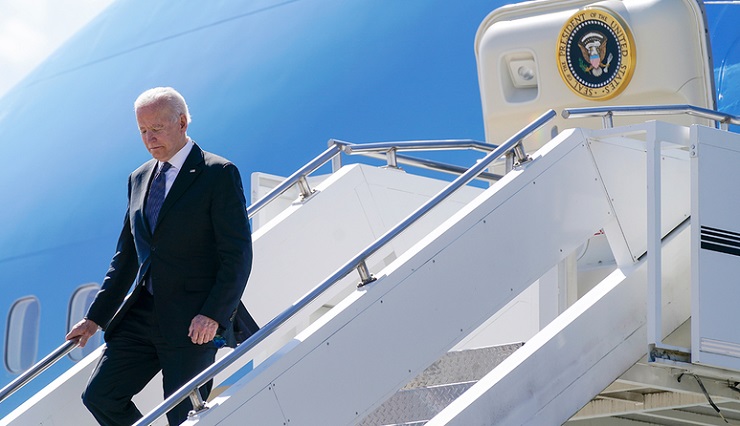While there was a lot of optimism surrounding the Biden-Putin summit in Geneva as a big leap towards re-defining US-Russia ties in an era when the US is primarily engaged with China as its leading competitor, the post summit developments have clearly shown that the rivalry between the US and Russia is too deep to be simply overcome just because the US has another country to focus on. On Sunday, two days after the summit, Biden’s National Security Adviser Jake Sullivan said in an interview to the CNN that the US was already preparing a new wave of sanctions to be imposed on Russia due to the Russian mishandling of Navalny, and that Washington will “continue to apply every 90 days sanctions against Russian entities involved in the construction of Nord Stream – 2.” Washington’s quick replace to its well-known strategy of sanctions indicates that Joe Biden & Co. essentially failed to bring Vladimir Putin in the loop against China. Their hopes that they can build upon some “underlying” Sino-Russia tensions and wean Russia away from China have once again proven to be an unrealistic assessment of the strength of Russia-China ties — which exist first and foremost against the US ambitions to establish unilateral domination.
While Russian Ambassador to the United States Anatoly Antonov was quick to respond to the sanctions as not something that was expected within days of the summit, it remains that a renewed effort by Washington to re-configure the Western alliance vis-à-vis both China and Russia is already well underway.
Following Biden’s tour of Europe, his secretary of state Antony Blinken launched his tour across Europe in a bid to achieve what a US diplomat reportedly called an attempt to get in a position to “control authoritarianism” in the world. Now, this is common knowledge that a reference to “authoritarianism” in the Beltway commonly refers to China and Russia, two of the US’ most powerful competitors aiming to undo the US unilateral hegemony of the world and create a more balanced multi-polar system with a level playing field for all, including Europe.
What Blinken will be building upon is the renewed NATO resolve to counter the ‘Russian threat.’ After the recent meeting between NATO and Biden in Brussels, the alliance not only vowed for the first time ever to counter China, but equally targeted Russia for its so-called “disinformation campaigns” that are said to have “hurt” Europe badly. “We are enhancing our situational awareness and expanding the tools at our disposal to counter hybrid threats, including disinformation campaigns, by developing comprehensive preventive and response options,” the final communique of the NATO-Biden summit said.
It is obvious that the Biden administration is framing a war against China and Russia as a wider “struggle” for the supremacy of “Western democratic” system against “Eastern authoritarianism”, a struggle that sufficiently includes economic ventures as well.
For instance, the fact that the US will continue to apply sanctions on Russian entities involved in Nord Stream – 2 project means that the Biden administration will continue to take steps against a project that it considers can and will undermine Europe’s energy security, which in turn could supposedly increase European dependence on Russia with potential consequences for Western democracies. While the fact that the US so often crates obstructions for Europe and directly undermines European sovereignty doesn’t seem to bother anyone in the Beltway, including the US media, it remains that most of the US actions vis-à-vis Russia, China and Europe remain targeted towards sustaining Washington as a hegemon, at least within the Western world.
It is with a view to uniting the West under US leadership that successive US administrations continue to paint Russia and China as “authoritarian” regimes, which need to be overthrown through “colour revolutions.” In this behalf, the Biden administration’s obsession with Navalny indicates how the US aims to use strictly internal political affairs of its target countries to supposedly create necessary conditions for “regime change” through internal political upheavals. As Biden noted before and after the summit, “I made it clear to him [Putin] that I believe the consequences of [Navalny dying in a prison] that would be devastating for Russia.”
All of this manifests Biden’s approach to create a unified Western front against Russia (as also China), an idea that he was quick to float in his very first State Department Speech that he delivered in February 2021. Even according to Jeremy Shapiro, the research director at the European Council on Foreign Relations, Biden’s policy is “signalling an incredibly hawkish approach to Russia, lumping it in with China, and defining a new global Cold War against authoritarianism”, a policy that is crucial for the US’ own survival in the 21st century.
Seeing in this context and how the Biden administration has renewed its efforts to create a wedge between the West and Russia (and China) as two mutually opposing and mutually exclusive systems that can do no business together, it becomes obvious that the euphoria surrounding the idea of fundamentally “resetting’” US-Russia ties is over. In the next few years, as competition between Russia and the US (and China and the US) would grow, it will make the US discourse vis-à-vis its rivals a lot more confrontationist and interventionist. At the same time, the US will continue to sell the mantra of ‘China threat’ and ‘Russia threat’ to Europe to minimise Europe’s strategic autonomy within and outside of the NATO alliance.
Salman Rafi Sheikh, research-analyst of International Relations and Pakistan’s foreign and domestic affairs, exclusively for the online magazine “New Eastern Outlook”.
 RSS Feed
RSS Feed















 July 17th, 2021
July 17th, 2021  Awake Goy
Awake Goy 
 Posted in
Posted in  Tags:
Tags: 













